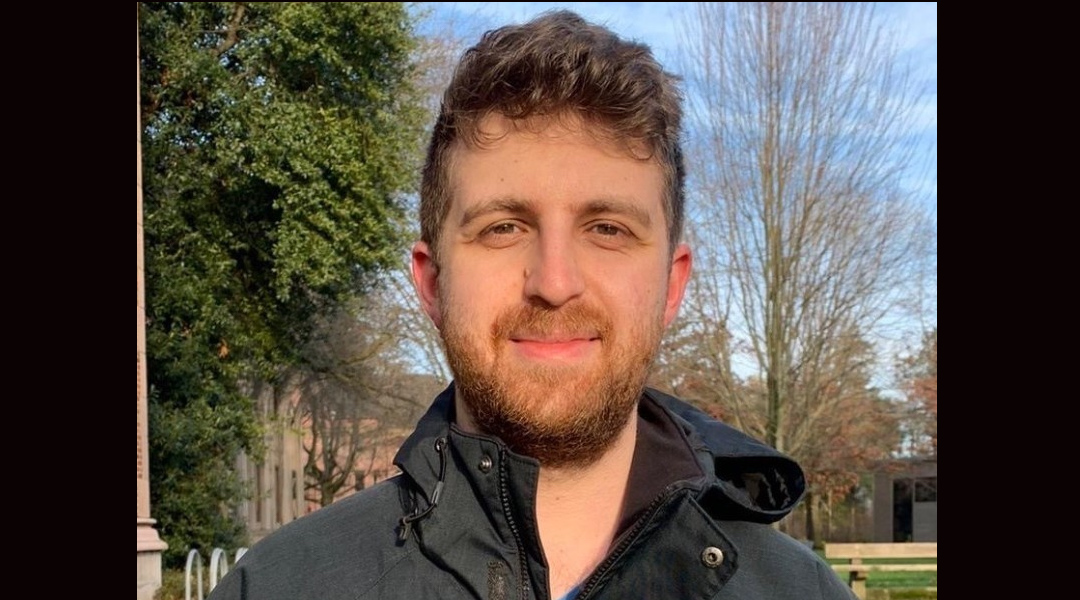Elan Ganeles, American killed in West Bank attack, remembered for his wit and friendship
Ganeles, who was raised in West Hartford, Connecticut and graduated from Columbia University, was shot while driving in the eastern West Bank

Elan Ganeles. (Consulate General of Israel in New York/Twitter)
(JTA) — Playing saxophone in the sukkah. Discussing Judaism over coffee. Hanging out with his brothers and friends in the basement on Shabbat.
These are a few of the memories that have emerged of Elan Ganeles, 26, the recent college graduate, raised in Connecticut, who was killed Monday when a gunman shot at him on a road near the Palestinian West Bank city of Jericho. Those who knew Ganeles remembered him as quiet and loyal, funny and down-to-earth.
“He was the kind of guy you could call, and you’d be sure he’d pick up and have a few minutes to talk if you needed something,” said Rabbi Yehuda Drizin of Chabad at Columbia University, who knew Ganeles as an undergraduate there. “For everyone that knew him, this is a kick in the gut. This really hurts.”
Ganeles grew up in West Hartford, Connecticut, where his family attended the local Orthodox Young Israel synagogue a block away from their home. As a teenager, Ganeles read Torah for the community. The synagogue has launched a fundraiser for his family and is bringing in grief counselors to help the community.
“Elan HY”D was a member of our [community] when we lived in Connecticut,” Shimshon Nadel, a rabbi in the Jerusalem neighborhood of Har Nof, wrote on Facebook, using a traditional Jewish acronym denoting when someone is murdered. “I remember him as a sweet boy with a great sense of humor. He played the saxophone and we would ‘jam’ together in the Shul’s Sukkah, during Hallel on Chanukah, and musical Havdalahs. Heartbreaking.”
Ganeles attended Modern Orthodox schools and the local Camp Gan Israel, and was involved in NCSY, the Orthodox youth group. At Hebrew High School of New England, he was an honors student and volunteered with the local Jewish Family Services, according to an article published about him in 2014. At the time, he said he was deferring enrollment at the University of Michigan and enlistment in the U.S. military to spend a year in Israel.
“You see so many different people,” he said, according to the 2014 article in We-Ha.com, a local online publication. “You can’t judge them. Everyone has their own story and you need to be more accepting of all.”
That year in Israel turned into more than two, as he enlisted as a “lone soldier” in the Israel Defense Forces and lived on a religious kibbutz in northern Israel with his fellow recruits from abroad. A compilation video of photos from the group’s time together, on Ganeles’ YouTube channel, is filled with pictures of him smiling as the group toured Israel. According to his LinkedIn page, Ganeles also worked for several months in the kibbutz dairy farm.
In the IDF, according to his LinkedIn, Ganeles rose to the rank of sergeant and worked as a computer programmer on financial monitoring systems. He did work for the Knesset Finance Committee and Israeli Ministry of Finance.
Penina Beede, who was in the class above Ganeles at their high school and spent many Shabbat afternoons with him and his brothers, said Ganeles stood out for his sense of humor.
“Everything he did and said came from a place of kindness and sweetness. But he had the most ridiculous sense of humor,” Beede said. “It was so uniquely Elan. … He would just say things that if anybody else said [them], you would be like, ‘Why would you say that?’ But his delivery was so perfect.”
Like Ganeles, Beede too, served in the Israeli army, and they compared notes and experiences.
Years after Beede finished her service and returned home to Connecticut, she tutored Ganeles’ youngest brother in Hebrew, and found herself back in the basement on Shabbat, hanging out with the family like she had back in high school. “It was good to see him that night,” she recalled.
Ganeles returned to the United States in 2018 to attend Columbia University where, according to a statement from the campus Hillel, he threw himself into student activities. He was involved in Tamid, a student group focused on Israeli business, as well as Jewish learning programs. The statement said, “We will miss his wry humor and thoughtful manner of discussing challenging or controversial topics.”
He spent a summer in Beijing and worked as a geospatial analyst at a campus center. Ganeles graduated in 2022 with a degree in sustainable development and neuroscience, according to his LinkedIn account.
He had traveled to Israel this week to attend a wedding, according to a statement from the Jewish Federation of West Hartford.
“He was a very good friend, and a loyal friend,” Drizin said, describing Ganeles as “a nice person, an easy person. After every interaction with him, you walked away feeling happy.”
Ganeles is survived by his parents Andrew and Carolyn, both physicians in West Hartford, and two younger brothers, Simon and Gabriel. The rabbi of Young Israel of West Hartford traveled to join the family in Israel, where Ganeles will be buried, and accompany them home to Connecticut later this week to sit shiva.
This article originally appeared on JTA.org.
A message from our CEO & publisher Rachel Fishman Feddersen
I hope you appreciated this article. Before you go, I’d like to ask you to please support the Forward’s award-winning, nonprofit journalism during this critical time.
We’ve set a goal to raise $260,000 by December 31. That’s an ambitious goal, but one that will give us the resources we need to invest in the high quality news, opinion, analysis and cultural coverage that isn’t available anywhere else.
If you feel inspired to make an impact, now is the time to give something back. Join us as a member at your most generous level.
— Rachel Fishman Feddersen, Publisher and CEO